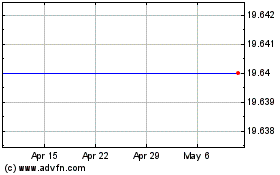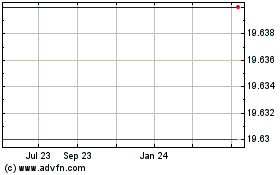Material Adverse Change' Clause Is Rarely Triggered
October 13 2016 - 8:18PM
Dow Jones News
By Vipal Monga and Thomas Gryta
Is a security breach that exposed 500 million consumer accounts
a material adverse change to an internet company's business?
That is a question that will determine whether Verizon
Communications Inc. lawyers could use the security breach disclosed
by Yahoo Inc. in September to renegotiate the terms of a $4.8
billion deal they struck in July.
Many merger agreements contain provisions allowing buyers to
withdraw from deals if the value of a transaction has been hurt by
a significant development. In the case of the Verizon/Yahoo deal,
such a change is defined as one that would "reasonably be expected
to have a material adverse effect on the business, assets,
properties, results of operation or financial condition of the
Business, taken as a whole."
The breach, which Yahoo blamed on a state-sponsored actor,
occurred two years ago but was discovered after the merger deal was
signed. On Thursday, Verizon's general counsel, Craig Silliman,
said "we have a reasonable basis to believe right now that the
impact is material."
Stephen S. Wu, a lawyer at the Silicon Valley Law Group, a law
firm, said Yahoo promised in the merger agreement that no security
breaches had taken place -- and that no breaches will have occurred
by the deal's closing.
That gives Verizon leverage to potentially renegotiate the deal,
or even walk away, he said. "This is an agreement written in a way
that there's a judgment call that needs to be made," Mr. Wu
said.
It is rare for companies to trigger material adverse change
clauses because courts have resisted their use, said Lisa Stark, a
partner at K&L Gates LLP. "It has to be a very substantial
event. It can't just be a hiccup."
The long-term effects of the data breach on Yahoo could tip the
balance, said Erik Gordon, a professor at the University of
Michigan Ross School of Business, making Verizon's case one of the
rare situations in which a buyer can terminate an acquisition
agreement.
In June, a Delaware judge ruled that Energy Transfer Equity LP
could back out of a nearly $33 billion deal for Williams Cos. since
the pipeline operator's lawyers couldn't deliver a necessary
opinion on the deal's tax treatment.
More important, Yahoo and Verizon aren't likely to go to court
because Yahoo's business has been declining and it may not want to
face the prospect of selling itself again.
"There is a price you will pay to not face the uncertainty of
going into a courtroom," Mr. Gordon said. "There is a lot of
incentive for Yahoo to work something out with Verizon."
Write to Vipal Monga at vipal.monga@wsj.com and Thomas Gryta at
thomas.gryta@wsj.com
(END) Dow Jones Newswires
October 13, 2016 20:03 ET (00:03 GMT)
Copyright (c) 2016 Dow Jones & Company, Inc.
Altaba (NASDAQ:AABA)
Historical Stock Chart
From Mar 2024 to Apr 2024

Altaba (NASDAQ:AABA)
Historical Stock Chart
From Apr 2023 to Apr 2024
